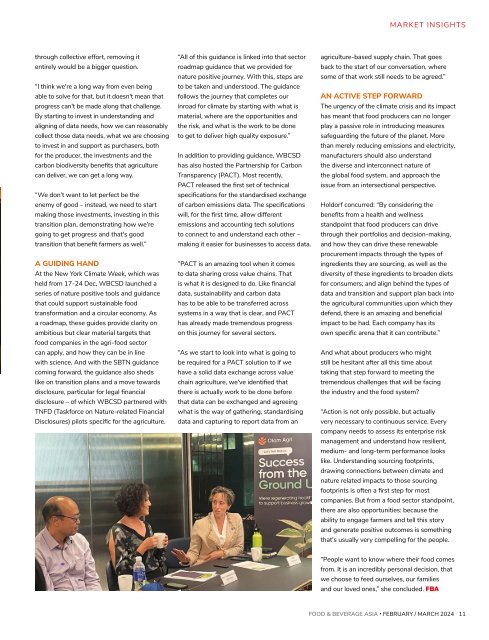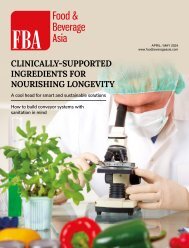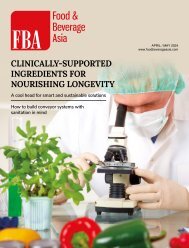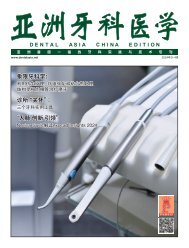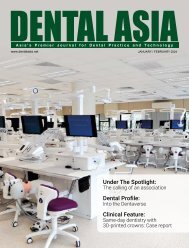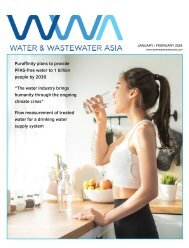Food & Beverage Asia February/March 2024
Food & Beverage Asia (FBA) is the leading source of food and beverage news in Asia since 2002. FBA delivers a comprehensive view of the food and beverage landscape, spanning across the latest health and nutrition trends and industry innovations in ingredients, recipe formulations, food science, sustainability, packaging, and automation, as well as advancements in agri and food-tech.
Food & Beverage Asia (FBA) is the leading source of food and beverage news in Asia since 2002. FBA delivers a comprehensive view of the food and beverage landscape, spanning across the latest health and nutrition trends and industry innovations in ingredients, recipe formulations, food science, sustainability, packaging, and automation, as well as advancements in agri and food-tech.
You also want an ePaper? Increase the reach of your titles
YUMPU automatically turns print PDFs into web optimized ePapers that Google loves.
MARKET INSIGHTS<br />
through collective effort, removing it<br />
entirely would be a bigger question.<br />
“I think we're a long way from even being<br />
able to solve for that, but it doesn't mean that<br />
progress can't be made along that challenge.<br />
By starting to invest in understanding and<br />
aligning of data needs, how we can reasonably<br />
collect those data needs, what we are choosing<br />
to invest in and support as purchasers, both<br />
for the producer, the investments and the<br />
carbon biodiversity benefits that agriculture<br />
can deliver, we can get a long way.<br />
“We don't want to let perfect be the<br />
enemy of good – instead, we need to start<br />
making those investments, investing in this<br />
transition plan, demonstrating how we're<br />
going to get progress and that's good<br />
transition that benefit farmers as well.”<br />
A GUIDING HAND<br />
At the New York Climate Week, which was<br />
held from 17-24 Dec, WBCSD launched a<br />
series of nature positive tools and guidance<br />
that could support sustainable food<br />
transformation and a circular economy. As<br />
a roadmap, these guides provide clarity on<br />
ambitious but clear material targets that<br />
food companies in the agri-food sector<br />
can apply, and how they can be in line<br />
with science. And with the SBTN guidance<br />
coming forward, the guidance also sheds<br />
like on transition plans and a move towards<br />
disclosure, particular for legal financial<br />
disclosure – of which WBCSD partnered with<br />
TNFD (Taskforce on Nature-related Financial<br />
Disclosures) pilots specific for the agriculture.<br />
“All of this guidance is linked into that sector<br />
roadmap guidance that we provided for<br />
nature positive journey. With this, steps are<br />
to be taken and understood. The guidance<br />
follows the journey that completes our<br />
inroad for climate by starting with what is<br />
material, where are the opportunities and<br />
the risk, and what is the work to be done<br />
to get to deliver high quality exposure.”<br />
In addition to providing guidance, WBCSD<br />
has also hosted the Partnership for Carbon<br />
Transparency (PACT). Most recently,<br />
PACT released the first set of technical<br />
specifications for the standardised exchange<br />
of carbon emissions data. The specifications<br />
will, for the first time, allow different<br />
emissions and accounting tech solutions<br />
to connect to and understand each other –<br />
making it easier for businesses to access data.<br />
”PACT is an amazing tool when it comes<br />
to data sharing cross value chains. That<br />
is what it is designed to do. Like financial<br />
data, sustainability and carbon data<br />
has to be able to be transferred across<br />
systems in a way that is clear, and PACT<br />
has already made tremendous progress<br />
on this journey for several sectors.<br />
“As we start to look into what is going to<br />
be required for a PACT solution to if we<br />
have a solid data exchange across value<br />
chain agriculture, we've identified that<br />
there is actually work to be done before<br />
that data can be exchanged and agreeing<br />
what is the way of gathering, standardising<br />
data and capturing to report data from an<br />
agriculture-based supply chain. That goes<br />
back to the start of our conversation, where<br />
some of that work still needs to be agreed.”<br />
AN ACTIVE STEP FORWARD<br />
The urgency of the climate crisis and its impact<br />
has meant that food producers can no longer<br />
play a passive role in introducing measures<br />
safeguarding the future of the planet. More<br />
than merely reducing emissions and electricity,<br />
manufacturers should also understand<br />
the diverse and interconnect nature of<br />
the global food system, and approach the<br />
issue from an intersectional perspective.<br />
Holdorf concurred: “By considering the<br />
benefits from a health and wellness<br />
standpoint that food producers can drive<br />
through their portfolios and decision-making,<br />
and how they can drive these renewable<br />
procurement impacts through the types of<br />
ingredients they are sourcing, as well as the<br />
diversity of these ingredients to broaden diets<br />
for consumers; and align behind the types of<br />
data and transition and support plan back into<br />
the agricultural communities upon which they<br />
defend, there is an amazing and beneficial<br />
impact to be had. Each company has its<br />
own specific arena that it can contribute.”<br />
And what about producers who might<br />
still be hesitant after all this time about<br />
taking that step forward to meeting the<br />
tremendous challenges that will be facing<br />
the industry and the food system?<br />
“Action is not only possible, but actually<br />
very necessary to continuous service. Every<br />
company needs to assess its enterprise risk<br />
management and understand how resilient,<br />
medium- and long-term performance looks<br />
like. Understanding sourcing footprints,<br />
drawing connections between climate and<br />
nature related impacts to those sourcing<br />
footprints is often a first step for most<br />
companies. But from a food sector standpoint,<br />
there are also opportunities: because the<br />
ability to engage farmers and tell this story<br />
and generate positive outcomes is something<br />
that's usually very compelling for the people.<br />
“People want to know where their food comes<br />
from. It is an incredibly personal decision, that<br />
we choose to feed ourselves, our families<br />
and our loved ones,” she concluded. FBA<br />
FOOD & BEVERAGE ASIA • FEBRUARY / MARCH <strong>2024</strong> 11


